X Character Flaws That Made Human Beings What They Are Today
Most of us are taught from a young age what it takes to be a good person. Be confident and independent, eat right and wash behind your ears our parents tell us. It’s all fine advice for those living in the modern world, but if our ancient ancestors had followed it we’d probably still be hanging out in the forest munching chiggers off each other’s backs. Turns out in order to become nature’s biggest winners, we first had to act like pretty big losers.
Gluttony
Today’s world is one in which it’s possible to legitimately purchase fried chicken filled donuts, given you accept the fact you’ll likely be stealthily filmed from the neck down when buying one for the local news’ latest “obesity epidemic” cover story. Should we feel guilty about our eating habits, or has humanity actually benefited from our hardwired urge to cover with gravy and devour anything dropped in front of us?
The thing is, there are plenty of animals that eat simple, healthy, plant-based diets, and for the most part, they don’t tend to be particularly bright.
Bad Hygiene
Scientists have long questioned why human beings evolved to become one of the few mostly hairless mammals on the planet. One leading theory is that our ancestors were dirty little monkeys who lost their hair as a way of escaping rampant parasites, particularly body lice we picked up from gorillas (don’t judge, the Pleistocene period was a crazy, experimental time man).
But how did losing our body hair help us become what we are today? Well now that we no longer had insulating fur covering us, we had to create clothing, and groups living in different areas produced varying levels of pigmentation to protect their exposed skin from the sun, leading to the development of race. Oh, and the need to keep warm may have also contributed to our ancestors learning one other mildly important skill…
Gossip
It was long thought that human beings developed language to aid in cooperation during hunting, but a new theory suggests that language may not have developed out in the forest with the men, but back around the campfire amongst the gossiping women. The fact that women may have been responsible for language is easy enough to believe considering even today when guys get together their vocabularies don’t seem to extend far beyond the words needed to describe a pair of tits or their buddies’ total gayness.
Social Anxiety and Depression
Our brains are about six times too big for an animal our size. Did mankind develop this massive amount of grey matter to help us in our long-standing mission to make mother nature our bitch? It seems unlikely since even animals that aren’t particularly brainy still make out okay in the wild. It’s more probable that humans managed to get a hang of the nature stuff pretty early on, and the real purpose of our huge leap in intelligence was to help us figure out our increasingly large, complex social groups. In other words, trying to navigate the perils of the lunchroom at school probably stimulates your mind more than any of your classes ever will.
Studying the skulls of our ancestors, scientists have found disproportionate growth in the parts of our brains used to construct mental simulations. Being able to play out different situations in your mind and predict possible outcomes is not just essential to surviving the social jungle, it’s also the basis of all problem solving. Basically every scientific or creative breakthrough in human history can trace its roots to some sweaty palmed caveman sitting alone in his hut fretting about whether the other cavemen think he’s cool, and conjuring up fantasies about what it would be like to finally talk to that cavegirl with the shapely brow ridge.
Depression played it’s part too, as some speculate depression evolved as a way to make people separate themselves from the group in times of stress, so they could try to simulate a solution to their problems in peace. So yeah, if your teenager’s being an angsty little punk, don’t worry, they’re actually contributing the betterment of the human race. Well unless they’re goth—everyone knows Goths are an evolutionary dead end.
Refusing to Grow Up
There are few quicker ways to get under a person’s skin than to call them childish. From a young age we’re pressured to be mature, but as it turns out refusing to grow up is a cornerstone of human evolution, so take that mom and dad.
Human childhoods are unique in that we’re born with a massive brain (just ask any woman who’s had to birth one of ‘em) and wriggling vestigial bodies, that grow slowly and don’t really change significantly until puberty. While most animals put all their energy towards quickly growing adult-like bodies, humans instead spend our early years strengthening the pathways in our brains and absorbing information. Our species’ unique ability to pass information and knowledge from one generation to the next, is due to the fact that humans essentially spend 20-years barfing in their offspring’s mouths before they finally kick them from the nest (and even then the barf keeps coming in the form of college tuition, weddings, and their old room again after the divorce).
Cracked.com--validating man-children using science since 2006.
Drunkenness
As diverse and sometimes conflicting as the world’s countless cultures can be, there’s at least one thing we share—we all love of getting shitfaced. Scientists suspect humans have been boozehounds since our very earliest days when we looked like something you’d hire an exterminator to chase out of your attic. Hell, our bodies are specially designed for alcohol consumption, with portions of our livers specifically designated for metabolizing alcohol. So human beings have been getting tanked for ages, but aside from helping ugly cavemen hook up, has it had any major effect on human progress?
So our entire modern society was founded on getting plastered. The more things change, the more they stay the same.
Nathan Birch contributes to the development of the human culture with his webcomic Zoology.
Gluttony
Today’s world is one in which it’s possible to legitimately purchase fried chicken filled donuts, given you accept the fact you’ll likely be stealthily filmed from the neck down when buying one for the local news’ latest “obesity epidemic” cover story. Should we feel guilty about our eating habits, or has humanity actually benefited from our hardwired urge to cover with gravy and devour anything dropped in front of us?
The thing is, there are plenty of animals that eat simple, healthy, plant-based diets, and for the most part, they don’t tend to be particularly bright.
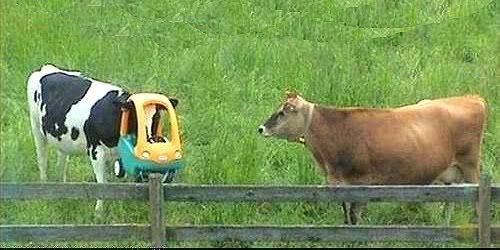
Dumb, yet delicious.
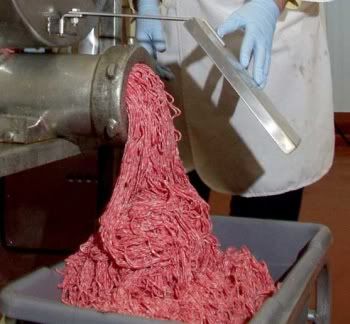
Best to just skip to the next entry vegetarians.
Bad Hygiene
Scientists have long questioned why human beings evolved to become one of the few mostly hairless mammals on the planet. One leading theory is that our ancestors were dirty little monkeys who lost their hair as a way of escaping rampant parasites, particularly body lice we picked up from gorillas (don’t judge, the Pleistocene period was a crazy, experimental time man).
But how did losing our body hair help us become what we are today? Well now that we no longer had insulating fur covering us, we had to create clothing, and groups living in different areas produced varying levels of pigmentation to protect their exposed skin from the sun, leading to the development of race. Oh, and the need to keep warm may have also contributed to our ancestors learning one other mildly important skill…
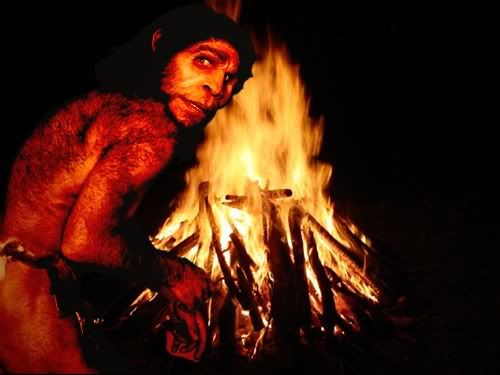
The marshmallow was discovered shortly thereafter.
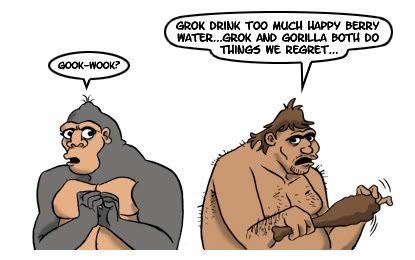
Gossip
It was long thought that human beings developed language to aid in cooperation during hunting, but a new theory suggests that language may not have developed out in the forest with the men, but back around the campfire amongst the gossiping women. The fact that women may have been responsible for language is easy enough to believe considering even today when guys get together their vocabularies don’t seem to extend far beyond the words needed to describe a pair of tits or their buddies’ total gayness.

Clearly female cavepersons were a lot more advanced.
Social Anxiety and Depression
Our brains are about six times too big for an animal our size. Did mankind develop this massive amount of grey matter to help us in our long-standing mission to make mother nature our bitch? It seems unlikely since even animals that aren’t particularly brainy still make out okay in the wild. It’s more probable that humans managed to get a hang of the nature stuff pretty early on, and the real purpose of our huge leap in intelligence was to help us figure out our increasingly large, complex social groups. In other words, trying to navigate the perils of the lunchroom at school probably stimulates your mind more than any of your classes ever will.
Studying the skulls of our ancestors, scientists have found disproportionate growth in the parts of our brains used to construct mental simulations. Being able to play out different situations in your mind and predict possible outcomes is not just essential to surviving the social jungle, it’s also the basis of all problem solving. Basically every scientific or creative breakthrough in human history can trace its roots to some sweaty palmed caveman sitting alone in his hut fretting about whether the other cavemen think he’s cool, and conjuring up fantasies about what it would be like to finally talk to that cavegirl with the shapely brow ridge.
Depression played it’s part too, as some speculate depression evolved as a way to make people separate themselves from the group in times of stress, so they could try to simulate a solution to their problems in peace. So yeah, if your teenager’s being an angsty little punk, don’t worry, they’re actually contributing the betterment of the human race. Well unless they’re goth—everyone knows Goths are an evolutionary dead end.
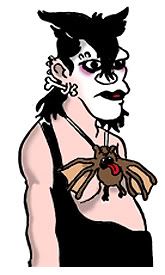
Scientists suspect the Homo Gothius subspecies were quickly wedgied out of existence.
Refusing to Grow Up
There are few quicker ways to get under a person’s skin than to call them childish. From a young age we’re pressured to be mature, but as it turns out refusing to grow up is a cornerstone of human evolution, so take that mom and dad.
Human childhoods are unique in that we’re born with a massive brain (just ask any woman who’s had to birth one of ‘em) and wriggling vestigial bodies, that grow slowly and don’t really change significantly until puberty. While most animals put all their energy towards quickly growing adult-like bodies, humans instead spend our early years strengthening the pathways in our brains and absorbing information. Our species’ unique ability to pass information and knowledge from one generation to the next, is due to the fact that humans essentially spend 20-years barfing in their offspring’s mouths before they finally kick them from the nest (and even then the barf keeps coming in the form of college tuition, weddings, and their old room again after the divorce).
Cracked.com--validating man-children using science since 2006.
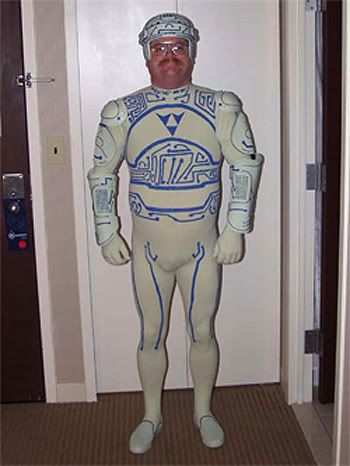
We're there for ya' man...
Drunkenness
As diverse and sometimes conflicting as the world’s countless cultures can be, there’s at least one thing we share—we all love of getting shitfaced. Scientists suspect humans have been boozehounds since our very earliest days when we looked like something you’d hire an exterminator to chase out of your attic. Hell, our bodies are specially designed for alcohol consumption, with portions of our livers specifically designated for metabolizing alcohol. So human beings have been getting tanked for ages, but aside from helping ugly cavemen hook up, has it had any major effect on human progress?

So our entire modern society was founded on getting plastered. The more things change, the more they stay the same.
Nathan Birch contributes to the development of the human culture with his webcomic Zoology.